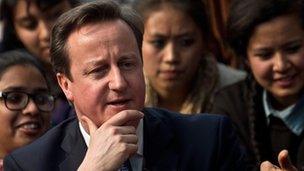Foreign students to stay in migration figures
- Published

The Prime Minister recently addressed college students in New Delhi
The government has refused to remove international students from its targets for cutting net migration, despite pressure from MPs and vice-chancellors.
Ministers had been urged to make it clear abroad that there was no cap on the number of foreign students who can study in the UK.
But they are standing by a definition of migrant which includes students.
Vice-chancellors and academics said there was a risk international students would not feel welcome in the UK.
'Not justified'
The refusal to budge follows pressure from five select committees, academics, vice-chancellors and experts to change the way students are accounted for in migration figures, which the government is trying to cut by "tens of thousands".
It comes in a response to the Commons Business, Innovation and Skills committee report on overseas students and net migration.
The committee had called on the government to urgently re-think its position, saying: "The inclusion of overseas students at accredited institutions in the overall total is misleading. Furthermore, it runs the risk of undermining a world class export market."
Universities UK president Eric Thomas said he was concerned the government's response to the select committee "was not justified by the evidence".
He said the number of international students coming to the UK was already falling and that feedback from universities suggested a decline.
He added: "The government's decision to ignore the recommendations of five parliamentary committees that students should not be included in the government's net migration target is disappointing.
"The more positive tone of the government's statement is important, but we also need action. We need the Home Office and the UK Border Agency to work constructively with universities to ensure that genuine international students are not discouraged from coming to the UK because of an unnecessarily obstructive visa system."
Last week the Prime Minister visited India, partly to drum up business for universities, and stressed there was no cap on the number of genuine foreign students.
General secretary of the academics' union, UCU, Sally Hunt said: "The government has made it very clear it wishes to reduce net migration, but its chaotic approach risks doing real damage to our standing on the global stage.
"Just last week the prime minister had to try and convince Indian students that Britain still welcomed foreign students.
"International students bring social and economic benefits to the country and the government could have sent a bold message today that British universities are open for business. Sadly, it is once again pandering to a domestic audience in a desperate effort to sound tough on immigration."
'Abuse'
The Department for Business, Innovation and Skills and the Home Office stressed in their joint response to the committee that they would "place no cap on the number of genuine students coming from across the world to study here".
But they stressed that they were sticking by what they describe as the international definition of net migration. This includes anyone "changing their normal place of residence for 12 months or more", even though students are required to leave when their student visa runs out.
The response said "the government recognised the important contribution that international students make to the economy", but that it was "also committed to reducing net migration".
"Eliminating the abuse of student migration route which has occurred in recent years, primarily in the private college sector, is a key part of that programme."
But it also cited a Home Office study from 2010 which showed about one in five international students who came to the UK in 2004 were still in the immigration system five years later.
And it said that the Office for National Statistics had made its migration statistics clearer, so that it was more easy for students to be identified in emigration flows "to give a more accurate measure of the contribution of students to overall net migration".
'Global standing'
The Committee's chairman Adrian Bailey MP, said: "Our report called for urgent action. The government replies with a response that is almost four months late. This is not acceptable.
"Given the delay, we expected a substantial piece of work. However, the response appears to offer nothing new and manifestly fails to give a clear answer to our key recommendation."
The National Union of Students said in response it was urging students to write to Home Secretary Theresa May and call on her to stop treating international students like a political football.
NUS International Students Officer Daniel Stevens said: "Since taking office the coalition government have continually treated international students as a political football so now we're asking people to contact the Home Office and give them the yellow card.
"The cross-party case for changing international student visas policy is overwhelming and has been backed by five committees. The government must urgently follow the lead of Australia and the United States and recognise that international students should not be included in net migration figures."
He added: "The government must now listen to experts and reverse their position before further damage is done to both the UK's global standing, the vibrancy of our campuses and the prospect of economic recovery."
- Published31 January 2013
- Published14 April 2011
- Published22 January 2013